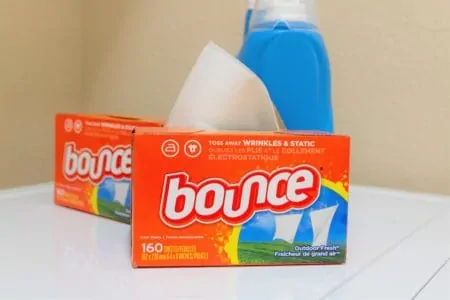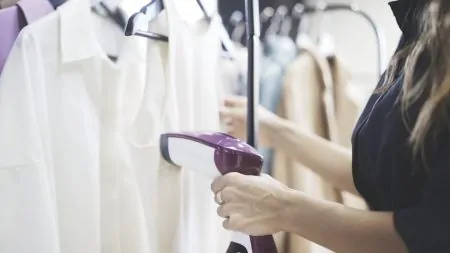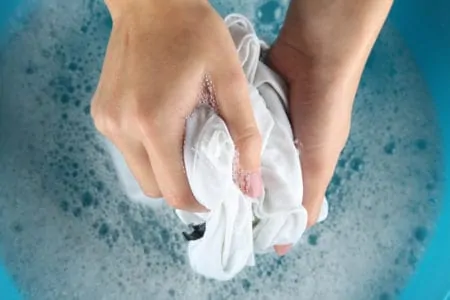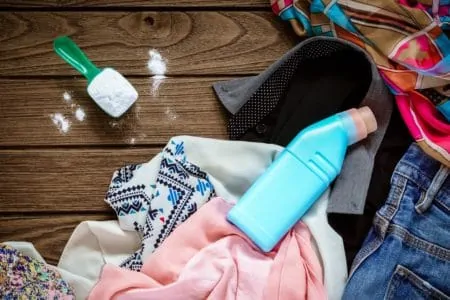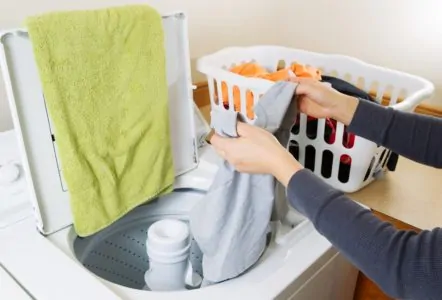Decisions, decisions! When it comes to dryer sheets vs fabric softener, which should you go for?
Both are designed to soften clothes, reduce static and wrinkles, and freshen your clothes.
In this post, we’ll discuss the key differences to hopefully help you make a decision.
Key Takeaways
- Both dryer sheets and fabric softeners soften clothes, reduce static and wrinkles, and add fragrance.
- Dryer sheets are cheaper and easier to use, but fabric softener may provide more benefits like preventing stretching, fading, and pilling.
- Both products can contain harsh chemicals that may cause skin and respiratory irritation.
- Consider alternatives like baking soda or white vinegar for fabric softeners, and dryer balls or aluminum foil for dryer sheets.
What Does Fabric Softener Do?
Fabric softener has key benefits, all which make it so popular in many households.
- It scents your clothes. Fabric softener comes in lots of different scents, so you can find one you love.
- It reduces static.
- It can reduce wrinkles.
- It softens your clothes so they don’t come out stiff and hard.
- Some softeners can protect your clothes from stretching, fading and pilling.
Is Fabric Softener Always Necessary?
Fabric softener is not always necessary. Some people skip using it entirely in their laundry routine. But even if you are a devoted fabric softener user, there are times when you should absolutely not use it.
When Not to Use Fabric Softener
- Don’t use fabric softener on towels. It can reduce their absorbency which defeats the towel’s purpose (1).
- Like towels, don’t use fabric softener on microfiber or water-resistant garments. Gym clothes need to absorb your sweat and odors, and fabric softener can reduce this ability.
- Don’t use it on flameproof clothes or pajamas as it can wear down this ability.
- Skip the fabric softener on any synthetic clothes.
- Don’t use fabric softener on baby clothes. First, baby clothes tend to be flameproof. Second, babies have sensitive skin and fabric softener often contains harsh chemicals.
Pros and Cons of Using Fabric Softener
If you’re unsure about fabric softener, here are some of the main pros and cons.
Pros
- It keeps fabrics soft.
- It can reduce wrinkles.
- It reduces static.
- It can protect garments from vigorously rubbing against each other and wearing down.
- It adds fragrance.
- They work alongside detergent.
- There are some plant-based options.
What Do Dryer Sheets Do?
Dryer sheets are a popular alternative to fabric softener. Unlike fabric softener, however, they go in the tumble dryer, not the washing machine. Add them to the top of your laundry before starting the cycle. Here are a few things dryer sheets can do.
- They prevent static build-up: Dryer sheets, like fabric softener, prevent static build-up.
- They freshen clothes: Dryer sheets come scented and unscented. Scented sheets can freshen your clothes. Some dryer sheets come with an ability to fight odors, rather than just mask them.
- They soften your clothes: Dryer sheets are made with fabric softening agents, such as fatty acids. The heat in your dryer spreads the softener across your clothes so they come out lush.
- Multiple other uses: You can use dryer sheets outside the laundry for dusting, cleaning your iron and freshening up your closet.
When Not to Use Dryer Sheets
Because dryer sheets are made similarly to fabric softener, you’ll want to avoid using them on the same fabrics.
- Don’t use dryer sheets on towels as this can reduce the absorbency.
- Don’t use on microfiber, water-resistant or gym clothes as this can also reduce the absorbance ability.
- Don’t use on flameproof clothes or pajamas.
- Don’t use on synthetic clothes unless the packaging instructions allow it. If so, use a low heat cycle.
- Don’t use them on baby clothes as this can reduce flameproof ability. Plus, babies have sensitive skin and dryer sheets still contain harsh chemicals.
Pros and Cons of Using Dryer Sheets
There are pros and cons to using dryer sheets. So before you buy some, check out this list.
Pros
- Easy to use. No need to pre-measure anything out, like fabric softener.
- They scent your clothes.
- Affordable.
- They soften your clothes.
- They reduce static cling.
- Can reduce wrinkles.
Cons
- They coat the clothing and can build up on your clothes.
- Dryer sheets contain harsh chemicals that can cause respiratory and skin irritation.
- They are not reusable, though some are compostable.
- They reduce the absorbency and flameproof ability of garments.
Fabric Softener vs Dryer Sheets
In summary, fabric softener and dryer sheets both soften clothes, reduce static and wrinkles, while adding fragrance.
However, both dryer sheets and fabric softeners contain some harsh chemicals. These chemicals can cause headaches, asthma attacks, and skin irritation.
Your Choice
Let’s compare some of the characteristics of both fabric softener and dryer sheets. Please note that every brand is different, so perhaps not all of these characteristics can be found in one product.
For example, if we say “sometimes” — then that is a unique characteristic found in a handful of products, rather than being a common trait.
| Function | Fabric Softener | Dryer Sheets |
| Prevents stretching, fading and pilling | Yes | No |
| Scent | Yes | Yes |
| Softens fabric | Yes | Yes |
| Fights static | Yes | Yes |
| Reduces wrinkles | Yes | Sometimes |
| Fights odors | Sometimes | Sometimes |
| Packaging | Plastic bottle | Cardboard box |
| Toxic chemicals | Yes | Yes |
| Price | $$ | $ |
Fabric Softener Alternatives
If you don’t like the sound of fabric softener, there are some effective alternatives you can try. Alternatively, you can look for a more natural option.
- Baking soda: Add ½ cup of baking soda to your detergent dispenser or your drum before washing clothes.
- White vinegar: Add ½ cup of distilled white vinegar to the fabric softener dispenser at the beginning of the cycle.
- DIY fabric softener: Make a homemade fabric softener recipe. Mix together two cups of Epsom salts, ½ cup of baking soda, and 40 drops of essential oil. Add two or three tablespoons to the rinse cycle of your laundry load.
Or, Just Skip The Softener
Dryer Sheet Alternatives
Likewise, there are many less toxic, reusable dryer sheet alternatives.
- Dryer balls: Dryer balls are very popular now and have the same effect as dryer sheets but without the chemicals. Plus, they’re reusable.
- Aluminum foil: Scrunch up a baseball-sized bit of aluminum foil and add it to the dryer cycle to fluff up and soften your clothes.
- Air drying your clothes outside: This can reduce static and wrinkles as well as adding freshness.
FAQs
Choices, Choices
When stuck between dryer sheets and fabric softener, it’s down to personal preference. Dryer sheets are easier to use and slightly cheaper, but fabric softener might have more benefits, depending on the brand you choose.
However, both products contain harsh chemicals so we recommend you check out some of our alternative options. Or go wild, and do laundry without either of these products!
